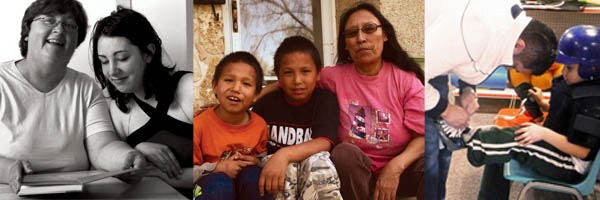Ranch Ehrlo’s Family Treatment Program (FTP) is one of the most unique programs we offer. Serving 24 families, with a staffing contingent of 40, it’s one of our largest, as well.
But it wasn’t always this way.
 David Rivers
David Rivers
David’s research brought him to Regina, where he asked to meet with Ranch Ehrlo founder, the late Geoff Pawson, to discuss the idea of Ranch Ehrlo developing a program to help keep families together and prevent out of home placements.
“They were very interested, but noted several challenges, including funding, for starting such a program,” David recalled. “The program would involve a fairly high start-up cost for homes and staffing, with no guarantee of referrals or revenues to support.”
David was hired at Ranch Ehrlo in 1997 and the idea of a family-based treatment program continued to be discussed, but it wouldn’t be put into action for nearly another decade. In the mid-2000s, David began developing proposals to secure the necessary start-up funding for the program and was ultimately successful in receiving over $150,000 through the federal Homelessness Initiative.
David added, "At the same time, we were looking at a variety of new ideas for improved family supports including family workshops, places for visiting families to stay, group homes with a family focus, and so forth."
In 2006, the program officially began.
“When it started, the Ranch still wanted it to be modelled off of the residential programs,” Patti explained. “They wanted youth care workers, with shift work – it took a lot of work to get it to where it is. The vision was for it to be social workers delivering the services.”
“I believed we needed people skilled in social work to be able to address the underlying issues that lent to the risks of children being removed from parental care,” she recalled.
“So, it continued to morph until the treatment was provided by therapists, who are all Registered Social Workers/Counsellors, who are trained in family work and have the theoretical perspectives and the models of clinical practice to be in the home with the families and working on individual and family based needs.”

In addition to the therapists, the team of staff include family treatment workers, who come from diverse educational backgrounds and support the therapists and families in achieving their goals. Families are offered in-home support with whatever challenges they are facing – whether it be establishing bedtime routines, grocery shopping and budgeting, or something else entirely – and parents attend weekly programming outside of the home to tackle their own treatment needs, while their children are cared for by early childhood educators at the program’s child care program. Program staff also assist families connect with community services that can help them continue to succeed once their time in the program has concluded.
The program has expanded six times since it began in 2006 – from serving three families at a time, to spaces for five, nine, 12, 15 and finally its present caseload of 24.
Last year the program served 58 families and 64 per cent of those families reunified. Thirty-four children were reunified to parental care, and 17 were preserved. In 2018 to date, 43 children have been reunified to their parents and 41 preserved in parental care.
“The family program remains unique. At this point, from the research and numerous presentations we have done, we have yet to find another agency delivering the unique services that Ranch Ehrlo offers through the FTP. Families are referred from all over Canada to take part. A critical part of that is choice – the FTP is a voluntary program and does not accept court ordered placements,” Patti said.
“Families are here because they want to be here and they’re ready to be here,” Patti concluded.


